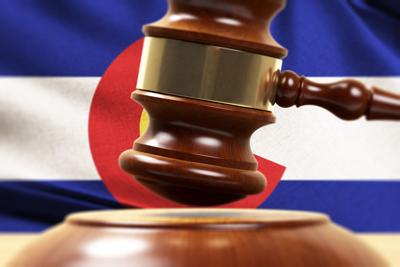When the restaurant where Michael Lawrence worked as a cook closed due to the coronavirus pandemic, he found himself out of a job. Unlike the other thousands of Coloradans suddenly unemployed, though, Lawrence filed a federal lawsuit against the governor and mayor of Denver.
“Because the defendants' Orders have limited the use of the plaintiff's place of work for the owners of the premises,” Lawrence wrote in a complaint filed in federal district court on Monday, “such a limitation constitutes a taking that requires the defendants to pay the plaintiff the reasonable value of the wages he has lost.”
The lawsuit comes six days after Denver Mayor Michael Hancock implemented a stay-at-home order that closed non-essential businesses and attempted to halt the congregation of groups of people, including at restaurants. The goal was to limit the person-to-person transmission of COVID-19. Two days later, Gov. Jared Polis’s statewide directive went into effect.
Lawrence flatly asserted that the “Wuhan flu does not constitute a crisis in Colorado,” referring to the city in China where the COVID-19 virus originated. He wrote that a small increase in the state’s death rate does not justify “the destruction of the Constitution and the thriving Colorado economy.” As of March 31, 51 people in Colorado have died from the virus.
“There's no alternative where no one dies,” Lawrence told Colorado Politics. “More people will die from economy-based suicides than from the flu, according to the research I cited. I have proposed an injunction that will result in far less death.”
In the lawsuit, Lawrence mentioned obesity, smoking and the seasonal flu as resulting in far higher deaths than COVID-19. While the death rate varies by country, estimates are that 0.1% of people die from seasonal flu, while it is expected that 1.8% will die in the United States after contracting coronavirus.
Lawrence pointed to restrictions on free assembly and free exercise of religion as violating the First Amendment, after his Catholic parish stopped holding Masses. The hiatus occurred before the stay-at-home orders, when all three bishops in Colorado voluntarily suspended gatherings to protect their parishioners. Nevertheless, the lawsuit compares the current situation to that of the internment camps for Japanese-Americans during World War II.
“In retrospect, a consensus exists now that internment was wrong. It was wrong for Japanese-Americans then, and it is wrong for Coloradans now,” the complaint argues. Lawrence elaborated that both situations were “motivated by panic and ignorance.”
The “internment of Coloradans,” as he described it, will be viewed someday as “a bad idea.”
On Friday, Fred Yarger, Colorado’s solicitor general under Attorney General Cynthia Coffman, described on a webinar with the Centennial Institute that states have powers to impose quarantines and limit travel, although there is not much case law for disaster declarations that pertain to pandemics.
“The courts are going to be OK with that for as long as the emergency is real,” he said, a view he reiterated on Tuesday.
"I’m not surprised by this lawsuit, and we might see more of them as the crisis continues," he added. "I don’t expect courts to second-guess these kinds of public health orders unless there is a compelling reason to do so in an individual case."
Polis said through a spokesperson that he could not comment on pending litigation, and Hancock's office said they believed that the city's stay-at-home order would help slow infections.
Lawrence’s legal argument, as laid out in the complaint, is that the government has used its powers of eminent domain to close businesses and has precluded him from using his vehicle to drive for work or personal reasons. His right to peaceably assemble with his friends or religious congregants is also unconstitutional. The defendants, rather than having a public health concern, “enjoy wielding power.”
If the court does not grant an injunction against the orders, Lawrence wrote, his industry will suffer and he will have difficulty finding employment. Referring to the stay-at-home orders as a “fake quarantine,” he asserted that other locations Coloradans can still visit — liquor stores and marijuana dispensaries — sell products that kill “far more people” than the flu.
When asked to point to statistics showing marijuana products being deadlier than the flu, Lawrence responded that “smoking anything during a flu pandemic where the really virulent flu strain focuses its attack on the lungs is a bad idea because overall lung health is compromised. With weakened lungs, a person exposed to the coronavirus is likely to get much sicker than someone with healthy lungs.”
Christopher M. Jackson, an attorney with Holland & Hart, said that the suit was unlikely to get far because the U.S. Supreme Court has ruled that in emergencies, states may use their regulatory powers to protect communities. "I think his strongest argument is probably the one about the free exercise of religion," Jackson said. "It's all essentially the same argument: 'the Constitution gives me the right to do lots of things in most situations, and in this really extreme situation, the government is telling me no.'
"The question is, is that OK?"
The case is Michael Lawrence v. The State of Colorado, et al.


(0) comments
Welcome to the discussion.
Log In
Post a comment as Guest
Keep it Clean. Please avoid obscene, vulgar, lewd, racist or sexually-oriented language.
PLEASE TURN OFF YOUR CAPS LOCK.
Don't Threaten. Threats of harming another person will not be tolerated.
Be Truthful. Don't knowingly lie about anyone or anything.
Be Nice. No racism, sexism or any sort of -ism that is degrading to another person.
Be Proactive. Use the 'Report' link on each comment to let us know of abusive posts.
Share with Us. We'd love to hear eyewitness accounts, the history behind an article.